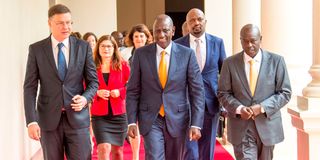Kenya signs economic partnership deal with European Union

President William Ruto (centre) and his deputy Rigathi Gachagua (right) host a European Union delegation at State House, Nairobi, for the signing of the Kenya-European Union Economic Partnership Agreement on June 19, 2023.
Kenya and the European Union (EU) have concluded negotiations on their Economic Partnership Agreement (EPA), paving the way for the final stage before Kenyan exports are granted unhindered access to the EU market.
President William Ruto yesterday oversaw the signing of the agreement between Trade Cabinet Secretary (CS) Moses Kuria and the Executive Vice-President and EU Commissioner for Trade, Valdis Dombrovskis, marking the conclusion of negotiations that have lasted for years.
Following the signing, Kenya and EU parliaments would have to ratify the agreement before it becomes effective. The deal grant Kenya’s exports immediate duty free and quarter free access to the EU market, while imports from the EU get gradual duty reductions in Kenya.
“The agreement covers several things that are very foundational and fundamental to trade and investment between the two partners. We have finalised an agreement on trading goods whereby we shall now have ease with regard to customs procedures.”
Movement of goods
“We have agreed on a modality to do with rules of origin, issues on how the movement of goods will be done, taxes and duties, non-tariff measures, transit standards, sanitary and phytosanitary standards,” said Trade Principal Secretary (PS) Alfred K’Ombudo, who was Kenya’s chief negotiator in the deal.
President Ruto said ratification of the deal was key to ensuring local farmers and investors access a guaranteed and stable market, which would also create jobs.
“Although the EU is already Kenya’s largest export destination, accounting for 21 per cent of Kenya’s total exports, the agreement we have negotiated provides significant opportunities to enhance this performance. It assures a stable market for industrialists, for our farmers and also industrialists in the EU that deal in machineries, mechanical appliances, pharmaceutical products, chemicals and other products of an assured market in our country,” the President said.
President Ruto noted that, while Kenya’s exports would be granted an immediate unhindered market access in the EU, it would take 25 years for imports from the EU to get full duty-free access in Kenya.
“We will grow our farm produce such as coffee, tea, vegetables, flowers and other products that we will export to the EU market [of] about half a billion people [in] 27 countries,” he said.
EU production
The President said part of the agreement is for EU and Kenyan companies to partner in value addition to ensure that Kenya’s exports fetch better prices in the EU, as well as in agro-processing and manufacturing.
The EU’s chief negotiator for the deal, Ms Dora Correia, said Kenya would get more investors with the assured EU market access, which would create a reliable business environment.
“Kenya’s exports will enjoy duty and quarter-free access to the European market from day one. Kenya, given its economic development status, will only have to open its own market for EU production later and very gradually,” she said.
Mr Dombrovskis added that part of the objective was to spur job creation as more EU companies would be interested in investing in Kenya.
“The goal here is to support job creation and sustainable economic growth with a particular focus on micro, small and medium-sized enterprises,” the diplomat said.





